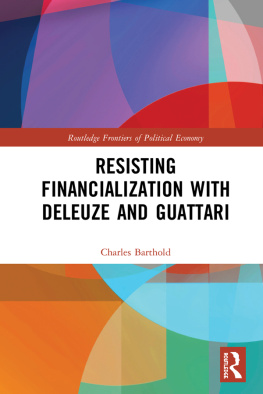Returning to Revolution
Plateaus New Directions in Deleuze Studies
Its not a matter of bringing all sorts of things together under a single concept but rather of relating each concept to variables that explain its mutations.
Gilles Deleuze, Negotiations
Series Editors
Ian Buchanan, Cardiff University
Claire Colebrook, Penn State University
Editorial Advisory Board
Keith Ansell Pearson
Ronald Bogue
Constantin V. Boundas
Rosi Braidotti
Eugene Holland
Gregg Lambert
Dorothea Olkowski
Paul Patton
Daniel Smith
James Williams
Titles available in the series
Dorothea Olkowski, The Universal (In the Realm of the Sensible): Beyond Continental Philosophy
Christian Kerslake, Immanence and the Vertigo of Philosophy: From Kant to Deleuze
Jean-Clet Martin, Variations: The Philosophy of Gilles Deleuze , translated by Constantin V. Boundas and Susan Dyrkton
Simone Bignall, Postcolonial Agency: Critique and Constructivism
Miguel de Beistegui, Immanence: Deleuze and Philosophy
Jean-Jacques Lecercle, Badiou and Deleuze Read Literature
Ronald Bogue, Deleuzian Fabulation and the Scars of History
Sean Bowden, The Priority of Events: Deleuzes Logic of Sense
Craig Lundy, History and Becoming: Deleuzes Philosophy of Creativity
Aidan Tynan, Deleuzes Literary Clinic: Criticism and the Politics of Symptoms
Thomas Nail, Returning to Revolution: Deleuze, Guattari and Zapatismo
Visit the Plateaus website at www.euppublishing.com/series/plat
RETURNING TO REVOLUTION
Deleuze, Guattari and Zapatismo
Thomas Nail
EDINBURGH
University Press
For the revolution under way
Thomas Nail, 2012
Edinburgh University Press Ltd
22 George Square, Edinburgh EH9 9LF
www.euppublishing.com
Typeset in Sabon
by Servis Filmsetting Ltd, Stockport, Cheshire, and
printed and bound in Great Britain by
CPI Group (UK) Ltd, Croydon CR0 4YY
A CIP record for this book is available from the British Library
ISBN 978 0 7486 5586 1 (hardback)
ISBN 978 0 7486 5587 8 (webready PDF)
ISBN 978 0 7486 5589 2 (epub)
ISBN 978 0 7486 5588 5 (Amazon ebook)
The right of Thomas Nail
to be identified as author of this work
has been asserted in accordance with
the Copyright, Designs and Patents Act 1988.
Contents
Acknowledgements
I wish to express my sincere appreciation to the following people for all their feedback and support during the writing and editing of this book: Ted Toadvine, Colin Koopman, John Lysaker and Tres Pyle. Over the years I have had many wonderful and fruitful discussions on the topics discussed in this book with many people; I would like to thank in particular: Kieran Aarons, Neal Miller, Daniel Bowman, Daniel W. Smith, Sean Parson, Nicolae Morar, Greg Liggett, Lindsay Naylor and the Theory Group at the University of Oregon Department of English (especially Tristan Sipley, Eric Luttrell, Shane Billings, Josh Magsam and Melissa Sexton). Not only in theory, but in practice, I am also extremely appreciative of all the dedicated activists and collectives I worked with during the writing of this book, who are committed to the difficult labour of direct democracy: the Students Cooperative Association, Cascadia Forest Defense and No One Is Illegal (Toronto).
Many of the following chapters were theorised and composed in Caf Roma, one of those rare cafs where there is no Internet and nothing but classical music. I am very thankful for this space. This book was also made possible in part by the financial and scholarly support of the US Fulbright Program, the University of Toronto and the Wayne Morse Center for Law and Politics, all of which provided me with the means, space and time to work on these chapters.
I am grateful to Carol Macdonald at Edinburgh University Press for her kindness and helpfulness during the final stages of the books preparation.
I would also like to thank my best reader and wife, Katie Riddle, for her contributions and company during all stages of this books creation.
A Note on the Text
In-text citations for all works by Gilles Deleuze (including those co-authored with Flix Guattari and Claire Parnet) are listed by their date of English translation. Their page numbers, however, are given first according to the page number(s) of the original French text and then followed by the page number(s) of the translated English text. All other in-text citations are to the extant translations, where such translations exist.
Preface

The year 2011 was one of incredible, worldwide revolutionary activity. Shortly after the completion of this book the largest global occupation movement in history crystallised in October 2011. This occupation movement is the practical and theoretical heir to the political strategies developed by Deleuze, Guattari and the Zapatistas as articulated in the chapters of this book. Inspired by the Arab Spring, the occupations in Wisconsin, the riots against austerity measures in Europe and the UK, and the occupations by the Spanish indignados and the Greeks at Syntagma Square, the Occupy movement has spread to over 2,556 cities across eighty-two countries, and over 600 communities in the United States (Occupy Together 2011). The Occupy movement is based on the popular outrage at the growing disparity of wealth and power between individuals and corporations, as well as the failure of political representatives to resolve the problems of increasing unemployment, housing foreclosures, paralysing student debt and the aggressive defunding of social services. But, as some theorists have correctly remarked, the Occupy movement is demonstrably more than a mere protest against greedy bankers and corrupt politicians: it is a sustained movement that is responding to the problems of global capitalism and the institution of political representation itself (Hardt and Negri 2011; iek 2011; Graeber 2011).
Rather than proposing a list of formal demands or lobbying political parties for reforms to the system (although such reforms would probably not be unwelcome), the Occupy movement has mostly resisted such negotiations as potential co-optations. If the problem were simply corruption or greed one would expect to hear a unified message for reform and legislation. This message could then be adopted by party politicians and mobilised in the next election. The fact that the Occupy movement has not delivered a clearly unified set of demands indicates a deeper mistrust of the very form of political representation itself that would respond to such demands. Additionally, the method of intervention chosen unlawful occupation should also indicate a breakdown of the normal legal channels that are supposed to respond to the will of the people. Instead of demanding reforms from representatives or even trying to create its own representatives or leaders, the Occupy movement has seized public space and tried to create its own form of direct democracy based on consensus decision-making, equality and mutual aid. In societies that have failed to provide many of its members with the basic necessities of life and failed to listen to their demands, the Occupy encampments around the world have decided to provide these things for each other. They have created kitchens, libraries, clinics and media centres open to everyone who needs them. The Occupy movement thus demonstrates that state capitalism itself is the cause of the current crisis. Not only does it express a popular acknowledgement that we do not live in the best of all possible worlds, it also demands that we start creating some alternatives to the current system here and now, and not wait around for political representatives or corporations to fix the problems they created.
Next page















